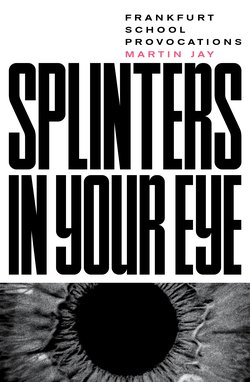Splinters in Your Eye

Реклама. ООО «ЛитРес», ИНН: 7719571260.
Оглавление
Martin Jay. Splinters in Your Eye
Отрывок из книги
Splinters in Your Eye
The Dialectical Imagination: A History of the Frankfurt Schooland the Institute of Social Research, 1923–1950 (1973 and 1996)
.....
Horkheimer brought to their deliberations a growing identification with socialism without any particular party affiliation, combined with a strong commitment to academic studies, which manifested itself in a successful philosophical apprenticeship first with Edmund Husserl in Freiburg and then Hans Cornelius in Frankfurt. Although not as wealthy as Hermann Weil, Horkheimer’s father, Moritz, was a successful factory owner from Stuttgart and a liberal assimilated Jew who patriotically supported the German war effort. His mother was entirely devoted to domestic pursuits, the most avid of which, by all reports, was providing her only son with unconditional love. Trained to succeed his father at the factory, the young Horkheimer was, however, motivated more by aesthetic yearnings than commercial ones. Although growing increasingly alienated from his parents’ values, he never broke with them personally, even when they disapproved of his love for the “unsuitable” woman he eventually married and objected to his academic career. Through the lifelong friendship he began at the age of sixteen in 1911 with Pollock, also the son of an assimilated Jewish industrialist, Horkheimer seems to have found a microcosmic foretaste of the egalitarian community of like-minded souls for which he clearly yearned.25 Although a sympathetic observer of the political turmoil after the war, he merely watched the events unfolding in Munich with the group around radical bohemian photographer Germaine Krull rather than participating directly in them. Nor was he swept up in the quest for religious authenticity that would inspire future Institute colleagues like Leo Löwenthal and Erich Fromm, who were for a while part of the Frankfurt Lehrhaus directed by Franz Rosenzweig.
During the Institute’s first few years, when Carl Grünberg served as director and its focus was on the history of the labor movement, Horkheimer was occupied primarily with his university studies, working with mentors like Cornelius and Gestalt psychologist Adhémar Gelb. However, he resisted becoming absorbed into the world of academic careerism, which Fritz Ringer would later call the realm of German mandarins in decline.26 As Adorno recollected about his first encounter with Horkheimer in Gelb’s seminar, he was “not affected by the professional deformity of the academic, who all-too-easily confuses the occupation with scholarly things with reality.”27 In addition to his more scholarly writings, he wrote a steady stream of aphoristic ruminations that only appeared pseudonymously in 1934 under the ambiguous title Dämmerung, which means both “dawn” and “twilight.” Wrestling with a number of issues—the relationship between theoretical and practical reason, the materialist underpinnings of philosophy, the complex interaction of theory and empirical research, the contribution psychoanalysis might make to social theory—Horkheimer came to the conclusion that only interdisciplinary work guided by a common goal might provide answers to questions that traditional scholarship and conventional politics had failed to address. When the opportunity came to replace Grünberg as Institute director following his debilitating stroke in 1928, Horkheimer was ready to launch an ambitious program whose outlines he spelled out in the inaugural address he gave in 1931 on “The Current Condition of Social Philosophy and the Task of an Institute of Social Research.”28 Two years earlier, Weil had succeeded in convincing the minister of education to transfer Grünberg’s chair in political science, originally endowed by his father, to one in social philosophy. Horkheimer, author of a newly published Habilitationschrift titled The Origins of the Bourgeois Philosophy of History, was selected to fill it and assumed the directorship in January 1931.
.....